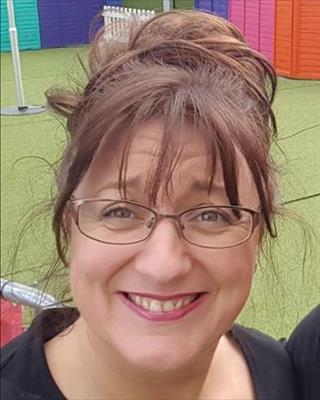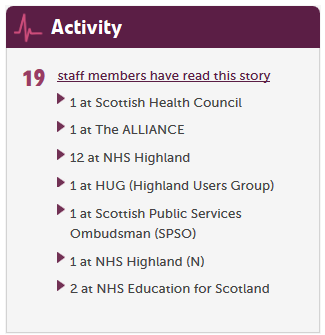
In the course of the Rapid Review undertaken by Healthcare Improvement Scotland in NHS Lanarkshire, the views of 300 patients and carers, and 200 members of staff were gathered. The NHS has developed expertise at gathering views. I have been that soldier: developing questionnaires, surveys, holding focus groups and consultation events, inviting people to development days and open space events. Yes, the NHS is good at gathering views, when they want to.
Gathering views is important but it’s not the most important thing: it’s what we do with the potentially rich information those views give us. Plugging them into a spreadsheet, producing a few colourful graphs and monitoring the graphs on a balanced scorecard is a great start, but if we asked the people who took the time to give us those views they’d probably say “so what?”. What difference will it make? What will change? What will be improved? In my last job I saw people getting “flipchart fatigue”: people (that’s staff as well as patients) get fed up giving views, which are written up on flipcharts which disappear into the ether and nothing happens. It’s one of the main reasons people cite as a barrier to giving feedback: I can see their point, can’t you?
And then there’s that big game changer: the NHS is no longer in charge of the feedback channel.
Let me share a story which Paul Hodgkin, our CEO, tells:
The Bed 7 story
Let’s begin with the fact that the person with the greatest incentive to get great care to Bed 7 is the person in bed 7. What is more, we know that by and large the person in Bed 7, together with their family, positively want to help staff deliver that great care.
So we have this huge wealth of willing volunteers just waiting to help. They may not be experts in ‘what’ should happen next but they are experts in many aspects of the ‘how’ of care
But patients and carers have always had an intense interest in getting the best care so what’s new? The game changer is that the person in Bed 7 (or his wife or son) can now tweet, or blog, or take a picture on their mobile phone. This gives them a public voice so they can talk to us, and about us, on their own terms.
No longer are the conversations about your mum’s care just held round the school gate, the water cooler or down the pub. Instead, they are at the end of an RSS feed waiting to be found.
And if staff and services choose not to listen to what you think about the way your mum is or is not cared for, you know that others will.
The public nature of these new channels means that staff and patients can now discover what each is saying quickly and cheaply. But responding to stuff on twitter or blogs can be tough especially for busy staff who have all too many demands on their time already. So just using our public voice, or just listening to tweets, is not, of itself, enough to release the resources of the person in Bed 7. What you need is a system that takes these comments and makes them easy for busy staff to use and that shows the person in Bed 7 that they have been listened to:
And that shows when a change has been made
One of the recommendations made by HIS is:
NHS Lanarkshire should review its processes for collecting patient and carer experience data, to ensure that patients and carers feel able to provide honest feedback that is reflective of both positive and negative aspects of care.
Do we really want to hear patient and carer voices? Do we want honest feedback? Do we want to show people how you are using what they are saying to make a difference? Then we must listen in every way, not just the ways we feel comfortable with.
We have been told repeatedly in the last few months that one of the crucial things to get right in driving up the quality of care is to really listen to patients and carers: constantly, consistently and to learn and improve based on what we have been told.
This is not just a message for NHS Lanarkshire: we know from Patient Opinion that patients, carers and staff have lots to say about services right across NHS Scotland. Many will be full of praise (around half of all stories on PO are thank you’s). Some will be critical but still full of suggestions, whilst others will be cries from the heart.
It can’t have been easy to be in the spotlight as NHS Lanarkshire have been in the last few days. But the good news is that we can now move beyond flip charts and surveys, good as these sometimes are. Now that we have real, practical ways to enlist the active feedback and support of patients and carers. We have a whole new set of resources to help change culture day in day out on the front line and we are really looking forward to working with NHS Lanarkshire in the year ahead.
Yes, these public conversations with patients about their care are new and a bit scary. But why wouldn’t we want to know what they think? Why wouldn’t we want to really involve the people of Scotland in getting this right, not just in Lanarkshire, but everywhere?
“The truth will set you free”
“The truth will set you free” https://www.careopinion.org.uk../../resources/blogpost-truth-screenshot-1.png Care Opinion 0114 281 6256 https://www.careopinion.org.uk /content/uk/images/logos/co-header-logo-2020-default.pngUpdate from Care Opinion Scotland
Posted by Gina Alexander, Director, Care Opinion Scotland, Care Opinion, on
About: NHS Scotland
Thanks for your feedback.

